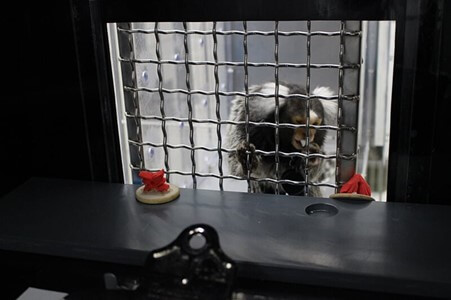PETA to Florida Gov. Ron DeSantis: Speak Up for Older Americans, Condemn Bogus Monkey Tests
For Immediate Release:
January 29, 2024
Contact:
Tasgola Bruner 202-483-7382
PETA is urging Florida Gov. Ron DeSantis to speak out against a sleep deprivation experiment so cruel it has been given the highest pain classification.
The experiment would blast noises at tiny marmoset monkeys as loud as those from a lawn mower every 15 minutes for three consecutive nights a week for up to two months—supposedly to learn about human age-related cognitive decline. DeSantis would be a powerful voice for good science as the leader of the state with the highest per-capita population of older Americans, who deserve sound science.
In a separate letter, PETA also is asking the National Institutes of Health (NIH) to yank its funding for the test.
“Any relevance to science in these tests is pure fiction, because disrupting monkeys’ sleep over multiple nights is as pointless as it is cruel,” says PETA Senior Vice President Kathy Guillermo. “PETA is urging Gov. DeSantis to condemn these indefensible tests and NIH to pull its funding.”

University of Massachusetts–Amherst experimenter Agnès Lacreuse, whose bizarre menopause tests on marmosets have come under fire, has proposed the sleep disruption experiments at a cost of $400,000 to U.S. taxpayers. She chose the Wisconsin National Primate Research Center at the University of Wisconsin–Madison—a site that lacks the necessary equipment, according to documents obtained by PETA, and is beset by federal animal welfare violations—to conduct the tests.
Lacreuse’s experiments will blast noises measuring from 60 to 90 decibels every 15 minutes during the night. The monkeys will be startled awake as many as 46 times during the night for a total of 276 minutes for three consecutive days over the weeks of the study. This is a scientifically flawed premise, because elderly humans experience poor sleep due to biological and neurological reasons, not typically because they’re startled awake regularly by loud noises.
Lacreuse also misrepresented the current science on her grant application to NIH. She claimed that using non-animal methods would be impossible and that no human data were available about the role that sleep disturbance plays in Alzheimer’s disease. But multiple NIH-funded studies using human volunteers have already investigated this connection.
PETA—whose motto reads, in part, that “animals are not ours to experiment on”—points out that Every Animal Is Someone and offers free Empathy Kits for people who need a lesson in kindness. For more information, please visit PETA.org or follow the group on X (formerly Twitter), Facebook, or Instagram.


